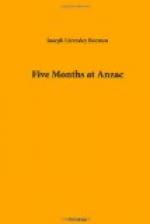The following morning Major Millard and I started from our right and walked up and across the battle-field. It was a stretch of country between our lines and those of the Turks, and was designated No Man’s Land. At the extreme right there was a small farm; the owner’s house occupied part of it, and was just as the man had left it. Our guns had knocked it about a good deal. In close proximity was a field of wheat, in which there were scores of dead Turks. As these had been dead anything from a fortnight to three weeks their condition may be better imagined than described. One body I saw was lying with the leg shattered. He had crawled into a depression in the ground and lay with his great-coat rolled up for a pillow; the stains on the ground showed that he had bled to death, and it can only be conjectured how long he lay there before death relieved him of his sufferings. Scores of the bodies were simply riddled with bullets. Midway between the trenches a line of Turkish sentries were posted. Each was in a natty blue uniform with gold braid, and top boots, and all were done “up to the nines.” Each stood by a white flag on a pole stuck in the ground. We buried all the dead on our side of this line and they performed a similar office for those on their side. Stretchers were used to carry the bodies, which were all placed in large trenches. The stench was awful, and many of our men wore handkerchiefs over their mouths in their endeavour to escape it. I counted two thousand dead Turks. One I judged to be an officer of rank, for the bearers carried him shoulder-high down a gully to the rear. The ground was absolutely covered with rifles and equipment of all kinds, shell-cases and caps, and ammunition clips. The rifles were all collected and the bolts removed to prevent their being used again. Some of the Turks were lying right on our trenches, almost in some of them. The Turkish sentries were peaceable-looking men, stolid in type and of the peasant class mostly. We fraternised with them and gave them cigarettes and tobacco. Some Germans were there, but they viewed us with malignant eyes. When I talked to Colonel Pope about it afterwards he said the Germans were a mean lot of beggars: “Why,” said he most indignantly, “they came and had a look into my trenches.” I asked “What did you do?” He replied, “Well, I had a look at theirs.”
TORPEDOING OF THE TRIUMPH
The day after the armistice, at fifteen minutes after noon, I was in my dug-out when one of the men exclaimed that something was wrong with the Triumph. I ran out and was in time to see the fall of the water sent up by the explosive. It was a beautifully calm day, and the ship was about a mile and a quarter from us; she had a decided list towards us, and it was evident that something was radically wrong. With glasses one could see the men lined up in two ranks as if on parade, without the least confusion.




